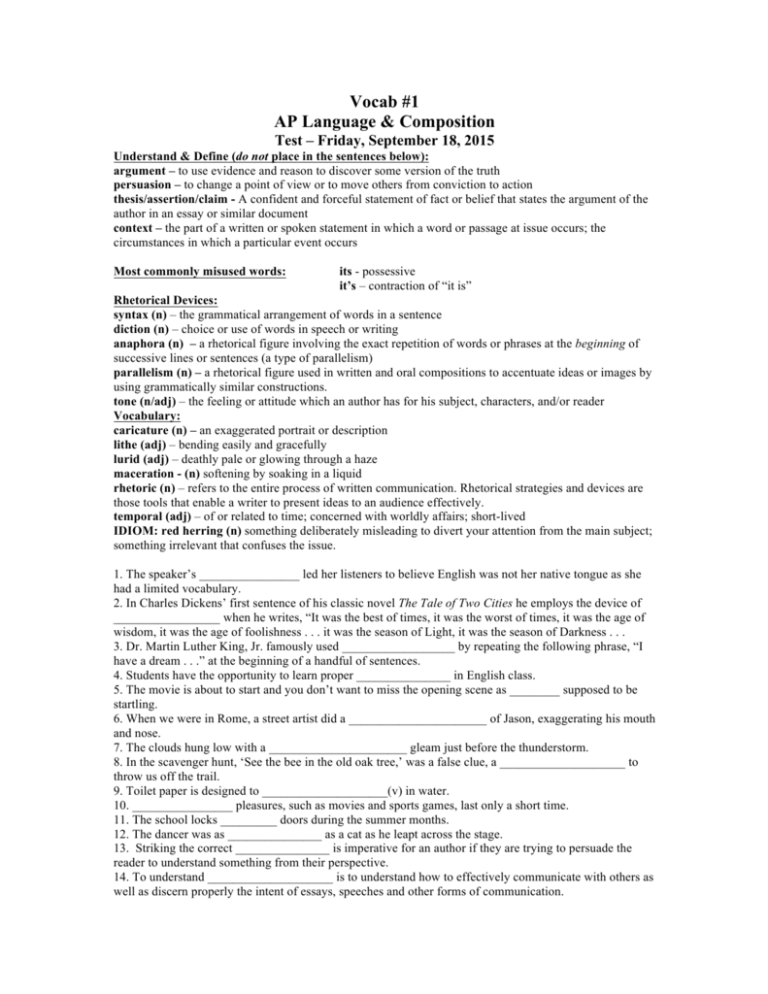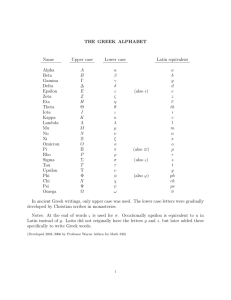Vocab #1/Roots #1 Quiz
advertisement

Vocab #1 AP Language & Composition Test – Friday, September 18, 2015 Understand & Define (do not place in the sentences below): argument – to use evidence and reason to discover some version of the truth persuasion – to change a point of view or to move others from conviction to action thesis/assertion/claim - A confident and forceful statement of fact or belief that states the argument of the author in an essay or similar document context – the part of a written or spoken statement in which a word or passage at issue occurs; the circumstances in which a particular event occurs Most commonly misused words: its - possessive it’s – contraction of “it is” Rhetorical Devices: syntax (n) – the grammatical arrangement of words in a sentence diction (n) – choice or use of words in speech or writing anaphora (n) – a rhetorical figure involving the exact repetition of words or phrases at the beginning of successive lines or sentences (a type of parallelism) parallelism (n) – a rhetorical figure used in written and oral compositions to accentuate ideas or images by using grammatically similar constructions. tone (n/adj) – the feeling or attitude which an author has for his subject, characters, and/or reader Vocabulary: caricature (n) – an exaggerated portrait or description lithe (adj) – bending easily and gracefully lurid (adj) – deathly pale or glowing through a haze maceration - (n) softening by soaking in a liquid rhetoric (n) – refers to the entire process of written communication. Rhetorical strategies and devices are those tools that enable a writer to present ideas to an audience effectively. temporal (adj) – of or related to time; concerned with worldly affairs; short-lived IDIOM: red herring (n) something deliberately misleading to divert your attention from the main subject; something irrelevant that confuses the issue. 1. The speaker’s ________________ led her listeners to believe English was not her native tongue as she had a limited vocabulary. 2. In Charles Dickens’ first sentence of his classic novel The Tale of Two Cities he employs the device of _________________ when he writes, “It was the best of times, it was the worst of times, it was the age of wisdom, it was the age of foolishness . . . it was the season of Light, it was the season of Darkness . . . 3. Dr. Martin Luther King, Jr. famously used __________________ by repeating the following phrase, “I have a dream . . .” at the beginning of a handful of sentences. 4. Students have the opportunity to learn proper _______________ in English class. 5. The movie is about to start and you don’t want to miss the opening scene as ________ supposed to be startling. 6. When we were in Rome, a street artist did a ______________________ of Jason, exaggerating his mouth and nose. 7. The clouds hung low with a ______________________ gleam just before the thunderstorm. 8. In the scavenger hunt, ‘See the bee in the old oak tree,’ was a false clue, a ____________________ to throw us off the trail. 9. Toilet paper is designed to ____________________(v) in water. 10. ________________ pleasures, such as movies and sports games, last only a short time. 11. The school locks _________ doors during the summer months. 12. The dancer was as _______________ as a cat as he leapt across the stage. 13. Striking the correct _______________ is imperative for an author if they are trying to persuade the reader to understand something from their perspective. 14. To understand ____________________ is to understand how to effectively communicate with others as well as discern properly the intent of essays, speeches and other forms of communication. The Word Within the Word List #1 ante (before) antedate, antecedent, antebellum, anterior, ante meridiem, antepenult Latin anti (against) anti-aircraft, antibody, anticlimax, anticline, antitoxin, antithesis Greek bi (two) bilateral, bicycle, binary, bimonthly, biped, bipolar, binocular, bicuspid Latin circum (around) circumnavigate, circumspect, circumvent, circumlocution, circus Latin corn (together) combination, comfort, commensurate, common, complete, combo Latin con (together) contract, confidence, confie, confederate, conjunction, contact Latin de (down) deposit, descent, despicable, denounce, deduct, demolish, decrepit, deplete Latin dis (may) distract, distort, dispute, dissonant, disperse, dismiss, dissuade, disprove Latin equi (equal) equitable, equilateral, equivocate, equinox, equation, equilibrium Latin extra (beyond) extraterrestrial, extraordinary, extravagant, extrovert, extramural Latin inter (between) international, interdepartmental,interstellar, interject, interlude Latin intra (within) intracellular, intravenous, intracranial, intrastate, intrauterine Latin intro (into) introduce, introspective, introvert, introject, introrse, intromission Latin ma1 (bad) malevolent, malcontent, malicious, malign, malady, malapropism, malonym Latin mis (bad) misfit, mistake, misfortune, misfire, misery, miser, misdeed, misguided non (not) nonstop, nonprofit, none, nonconformity, nonplussed, nonchalant Latin post (&r) postgraduate, posthumous, postscript, posterity, posterior, postlude Latin Pre (before) prelude, preposition, premonition, premature, predict, predecessor Latin semi (hdfl semitone, semiaquatic, semicircle, semiweekly, semiannual, semiformal Latin sub ( d r ) subterranean, subtract, subordinate, submarine, subterfuge, substantial Latin super (over) supervise, superb, superior, superfluous, supercilious, supernatural Latin SY" (together) synthetic, synchronize, syndrome, synonym, synopsis, syntax Greek SY m (together) sympathy, symbiosis, symbol, symmetry, symphony, symposium Greek tri (three) tricycle, triangle, triceps, triad, trichotomy, triceratops, trivia, trialogue Greek (not) unfit, unequal, undone, unequivocal, unearned, unconventional, untenable Germanic Old English








